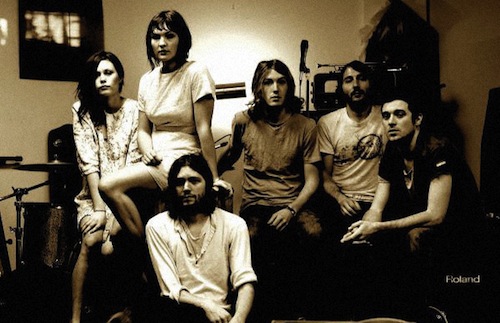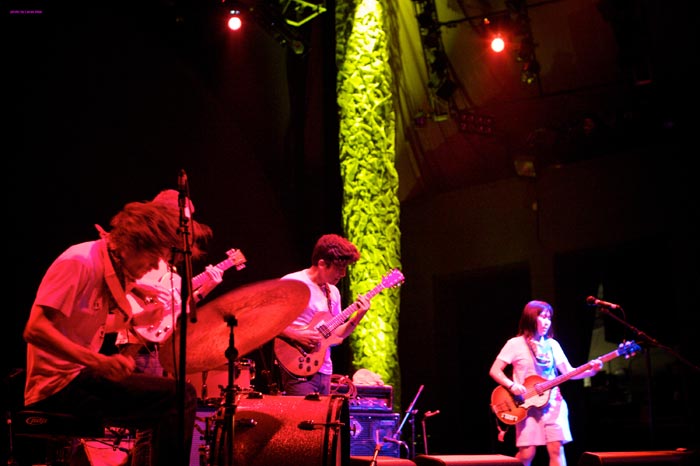It was the summer of 2007 and Kristin Hersh, frontwoman for the then-defunct band Throwing Muses, was at the end of a seven-month tour to promote her latest solo record. Hersh and her 10-person coterie had about a week left on the road, and they were en route from Seattle to Minneapolis when the tour bus hydraulic pump blew up in the middle of the Idaho wilderness.
The group—five musicians, two crew members, two dogs and Hersh’s three kids—were left stranded for two days on a U.S. Forest Service Road, until Hersh’s husband/manager Billy O’Connell was able to get a ride into town.
Hersh eventually loaded the troupe and their equipment into rented vehicles so that they could soldier on and finish the tour. But she was confronted with a grim reality: Although her shows were well attended, the economics of touring with a large band meant that being on the road itself would “net us exactly nothing but debt,” Hersh says. Factoring in the cost of bus repairs and car rentals would plunge her even deeper into the red.
Hersh’s listeners caught wind of her car problems through online message boards, and completely unprompted and to Hersh’s surprise, they began donating funds en masse. By the end of the tour, Hersh had collected more than $10,000, enough to help her break even. “It was as if the accident never happened,” O’Connell says.
For Hersh and O’Connell, the experience led to an epiphany.
“We finished the tour thinking about this—look at the power of the people,” marvels O’Connell. “Look at what they were able to do: Raise super amounts of money without it hurting anyone because everyone did a little bit. And yet, we were watching unimaginative exploitation of Kristin’s record at the same time through the tour, and we were playing to more human beings than units sold, so what was going on? That conspiracy of events brought about the idea that the crowd has strength, and the record companies are intermediaries that are playing a decreased role and are becoming irrelevant.”
A month after Hersh’s tour, following countless hours of calls between O'Connell and kindred spirit Robert Fagan (manager of Donita Sparks of the punk band L7), the collaborators came up with a response to what they saw as the shortcomings of the music industry. They called their solution CASH Music.
Strange Angels
The Coalition of Artists and Share Holders, a.k.a CASH Music, is part open source tech tool and part web marketing think tank with two primary goals: Connect artists directly with their listeners, and creatively monetize music to sustain musicians in the digital era.
Since its launch in July 2007, CASH has worked on marketing and promotion projects for 46 bands and six indie labels, using strategies ranging from straight sales to a pay-what-you-can model to completely free web streaming of a new record.
After working out an individualized strategy with executive director Jesse von Doom, each band receives a handsome and interactive web page designed with open source code, which then becomes part of a larger CASH network. (While some free CASH tools such as a sound player are already available, its open source platform will become public by mid-year.)
Indie darlings—such as San Francisco’s Deerhoof, for example—have used their CASH site to garner buzz and connect with fans by offering downloadable sheet music to the first single from its 2008 album, Offend Maggie. The band encouraged listeners to record their own version of the song, and then post a link to the song on the Deerhoof CASH site for all to hear.
 Meanwhile, experimental art band Xiu Xiu (left, who have a new record coming out tomorrow, on February 23) aimed to show appreciation for its fans by taking a picture of the people who came to their shows in April 2009. The group then posted every photo on its CASH page.
Meanwhile, experimental art band Xiu Xiu (left, who have a new record coming out tomorrow, on February 23) aimed to show appreciation for its fans by taking a picture of the people who came to their shows in April 2009. The group then posted every photo on its CASH page.
And emerging bands like Los Angeles’ Family of the Year (below) are finding that their CASH affiliation can actually be quite profitable since fans can pay what they want to download the record directly from the band’s web site. This frees the group from the 30 percent commission that iTunes and Amazon routinely charges.
Hersh, for her part, served as the guinea pig for CASH and she remains one of the most regular and active users of the platform. While all visitors to her CASH site can stream or download her albums for free (she suggests a $3 donation made via PayPal) or take song “stems” for remixing, Hersh has found success in a tiered subscription model.

Under Hersh’s rubric, the lowest level of sponsorship goes for $120 a year, and a fan receives two tickets to a live show, CDs before the release date and access to “lots of cool ‘other stuff’” via a subscriber’s page. At the highest level of support, the $5,000 executive producer tier, subscribers can visit Hersh at her recording studio and they receive an executive producer credit on her next CD.
“It’d be great if I were a trust fund kid and I could just give it all away,” Hersh says of her music. “Money is a big part of the equation. It’s why we called the organization ‘CASH.’ We wanted to be upfront about it: Musicians need to pay recording costs and their rent. I’ve had to stop working so many times in my career because I wanted to take the dollar sign away from music so bad, but then I couldn’t afford to go into studio. Throwing Muses ended because it cost so much to tour and record, and that was the most heartbreaking event of my life—to lose the band that I’d had since age 14. So freedom to work is the goal, the freedom to reach listeners with no middleman.”
Hersh calls her financial backers her “Strange Angels,” taken from the title of her 1998 solo album, and at any given time, she has several hundred angels in 12 countries and five continents. “I was stunned,” Hersh says. “I thought I would be getting by or admitting that this was a beautiful but failed experiment, and yet I’m not only working but I’m at top of my game. I’m allowed to be on fire, rather than frustrated because listeners have stepped up.”
Corporate Rock Still Sucks
The seeds of CASH were decades in the making, planted during Hersh’s increasing disenchantment with the music industry as the frontwoman for Throwing Muses, which had its heyday in the ‘90s amid the thriving alternative and indie rock scene. The group had both a committed fan base and major label backing, but Hersh says she never made more than $2,000 a year through her label at the time, Warner Bros. Records.
“They charge you for all of their publicity and advertising,” she says. “There are any number of ways that they can create this bizarre budget where the artists is charged for everything.”

Hersh (left) also says that she became increasingly uncomfortable with the way that the label asked her to contort her image and cede creative control in order to sell records.
“Probably the first conversation that really led to CASH was in the ‘90s when someone at the record label [we were signed with] suggested that the next Muses record should sound like ‘blank’ so that it could sell a million records,” Hersh recalls. “I said, No. Right now, you can go buy the record of some one-hit wonder and those musicians can’t pay rent. I’m still working because I’m looking to refine instead of expand my audience. I’m not looking to fill enormous rooms and bank accounts. I’m looking to work. That’s what CASH is trying to solve, that equation.”
Mark Goldstein, a former Warner Bros. Records exec who is now a clinical professor of music at the University of Southern California, says that he can appreciate Hersh’s frustration with the major label system. “Warner Bros. was known as the artist-friendly record label, and everyone loved Throwing Muses—but even with that, with a company of that size, practicalities sometimes got in the way of goodwill,” he says. “That’s the advantage of doing it yourself—you are less constricted by outside forces.”
Hersh’s desire to conserve control and to simply keep on writing and performing music resonates with a number of CASH bands.
 “After many years being in the band and being very hands-on, at some point we stopped worrying about label support,” says SMV, keyboardist for the New York-based band RENMINBI, which self-released its 2009 EP, “Surface,” for free via CASH. “Our goal for the future is to maintain our independence. What we were missing is better distribution. CASH was like that missing puzzle piece, it could just fit in exactly where we needed it.”
“After many years being in the band and being very hands-on, at some point we stopped worrying about label support,” says SMV, keyboardist for the New York-based band RENMINBI, which self-released its 2009 EP, “Surface,” for free via CASH. “Our goal for the future is to maintain our independence. What we were missing is better distribution. CASH was like that missing puzzle piece, it could just fit in exactly where we needed it.”
“I know a lot of people who might not be able to afford top-tier services who are making world-class art that shouldn't be lost,” adds CASH’s von Doom in an email. “The margins are just too tight and that music is too precious to vanish because they simply didn't have resources to get it out into the world. … For now, really, I just hope CASH can help artists do what they need to do online.”
But CASH will not work for every band; record companies still provide high-level promotion and marketing support, as well as access to distribution channels.
“If you are looking sell a million records worldwide and to be a multimedia megastar, [the CASH] model will not work well,” says Goldstein, the USC professor. “You can’t get the economies of scale to work. But if you have a fan base that is committed, then this can be a remarkably effective way stay in touch with audience and to create a two-way street for communication between artists and fans.”
Goldstein also says that the music industry is changing, and it’s moving in CASH’s direction.
“Five years from now, it’s quite possible that there will only be two labels taking these unformed artists and turning them into megastars,” he says. “And then there will be this whole biosphere of labels out there, from the one that’s run from some guy’s bedroom to the progeny of CASH. That’s where a majority of the action is likely to be.”
“Music will be less contorted into a mold that fits what the mold-makers want,” Goldstein continues. “Artists will still make money, but they won’t have thousands of groupies, or have the money to do weird things with sharks, or trash their hotel rooms, and I think that’s all for the best as far as the music is concerned.”

Full Circle
Whether CASH can catapult all of its artists toward satisfying and sustainable music careers remains to be seen, but it has, at the very least, enabled the return of the venerable Throwing Muses.
In late January, after seven years of silence, the band quietly released its first new song, “Sunray Venus,” in demo format, which the group made available as a free download on its CASH site.
The demo is accompanied by a manifesto-meets-love letter to CASH written by Hersh:
The band I started when I was fourteen, Throwing Muses, never broke up. We never suffered ‘creative differences,’ we didn't get complacent and sucky; we've always adored each other and were driven to play good music together. But touring and recording both cost money and don't always make enough to pay the bills, so eventually, we could no longer afford to work. … Now with the help of CASH and my Strange Angels, it looks like the Muses may work again.”
A new Muses demo will appear on the CASH site each month, and the band also plans to daylight the recording process by posting blogged commentary and audio recordings from conference calls as the band members—who each live about 1,200 miles away from each other—create the record long distance. The full album will be released next spring. It appears that the band whose death inspired CASH is now being revived by it.
“It comes full circle,” Hersh says. “If CASH could really solve that problem of how to make music sustainable and the problem of needing a label to do the work, it would be happy ending to the story and it would change my life, and I could sleep at night.”








